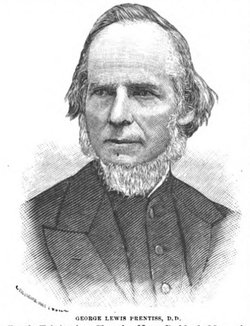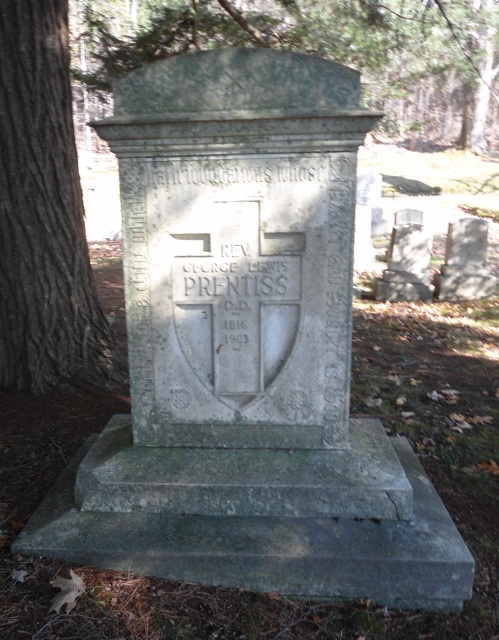George Lewis Prentiss, D.D., born at Gorham, Me., May, 1816; graduated at Bowdoin College, 1835; was assistant in Gorham Academy, 1836-7; studied theology at the universities of Halle and Berlin, in German, 1839-41; was settled over the South Trinitarian Church, New Bedford, Mass., in April, 1845; became pastor of the Mercer Street Presbyterian Church, New York city, in April 1851; received
the degree of D.D., from Bowdoin College, 1854; resigned on account of ill health in the Spring of 1858 and went abroad for two years; on his return gathered a new congregation on Murray Hill (the Church of the Covenant), and was
installed its pastor in the Spring of 1862, and resigned in April 1873, in order to accept a call to the Skinner and McAlpine Professorship of Pastoral Theology, Church Polity and Mission Work in the Union Theological Seminary.
Later, Pastoral Theology having been transferred to the Chair of Sacred Rhetoric, Apologetics and Christian Ethics were added to Dr. Prentiss chair. Beside numerous sermons and addresses, he has published A Memoir of Sargent S.
Prentiss (his brother), two volumes, 1855; new edition, 1879; A Discourse in Memory of Thomas Harvey Skinner, D.D. LL.D., 1871; The Life and Letters of Elizabeth Prentiss (his wife), 1822; The Free Christian State, or the Present
Struggle, 1861; The National Crisis, an address before the P.B.K., Dartmouth College, 1863; The Political Crisis, 1866; Our National Banner, or the Dry Rot in American Politics; and a Tract for the Times, Touching Civil
Service Reform, 1877.
Dr. Prentiss is a forcible and faithful preacher, an eminent scholar, and held in the highest esteem by the Church.
Quoted verbatim from: Alfred Nevin, David Robvert Bruce Nevin, editors, Encyclopaedia of the Presbyterian Church in the United States of American (Philadelphia: Presbyterian Encyclopaedia Publishing Co., 1884, page 636.
George Lewis Prentiss, D.D., born at Gorham, Me., May, 1816; graduated at Bowdoin College, 1835; was assistant in Gorham Academy, 1836-7; studied theology at the universities of Halle and Berlin, in German, 1839-41; was settled over the South Trinitarian Church, New Bedford, Mass., in April, 1845; became pastor of the Mercer Street Presbyterian Church, New York city, in April 1851; received
the degree of D.D., from Bowdoin College, 1854; resigned on account of ill health in the Spring of 1858 and went abroad for two years; on his return gathered a new congregation on Murray Hill (the Church of the Covenant), and was
installed its pastor in the Spring of 1862, and resigned in April 1873, in order to accept a call to the Skinner and McAlpine Professorship of Pastoral Theology, Church Polity and Mission Work in the Union Theological Seminary.
Later, Pastoral Theology having been transferred to the Chair of Sacred Rhetoric, Apologetics and Christian Ethics were added to Dr. Prentiss chair. Beside numerous sermons and addresses, he has published A Memoir of Sargent S.
Prentiss (his brother), two volumes, 1855; new edition, 1879; A Discourse in Memory of Thomas Harvey Skinner, D.D. LL.D., 1871; The Life and Letters of Elizabeth Prentiss (his wife), 1822; The Free Christian State, or the Present
Struggle, 1861; The National Crisis, an address before the P.B.K., Dartmouth College, 1863; The Political Crisis, 1866; Our National Banner, or the Dry Rot in American Politics; and a Tract for the Times, Touching Civil
Service Reform, 1877.
Dr. Prentiss is a forcible and faithful preacher, an eminent scholar, and held in the highest esteem by the Church.
Quoted verbatim from: Alfred Nevin, David Robvert Bruce Nevin, editors, Encyclopaedia of the Presbyterian Church in the United States of American (Philadelphia: Presbyterian Encyclopaedia Publishing Co., 1884, page 636.
Family Members
Sponsored by Ancestry
Advertisement
Advertisement
















